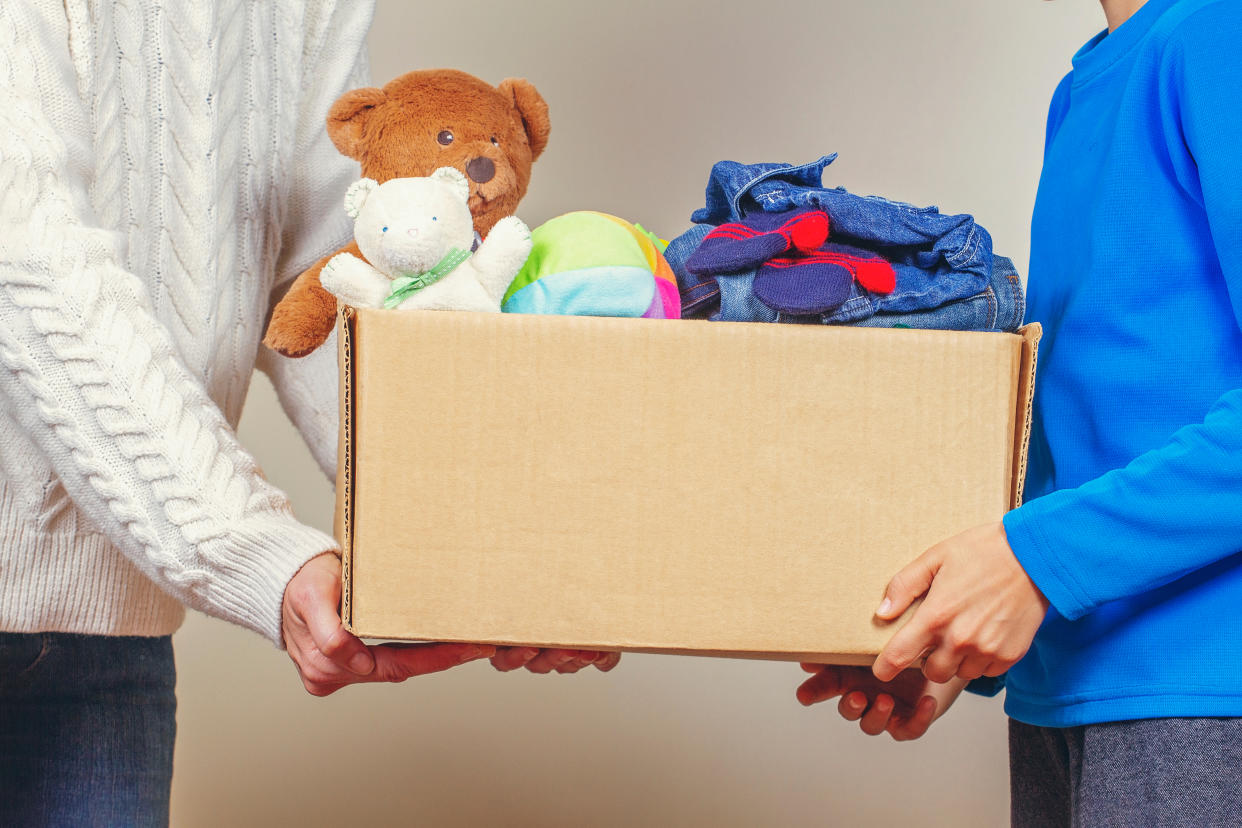Why shoppers are choosing Buy Nothing groups over stores: They ‘don’t want to … buy another piece of plastic crap’

You need something: a blow-up mattress for the houseguests headed your way, poster board for the school project your kid just announced she has due tomorrow, some extra serving platters for your next dinner party. You can head to the store. You can try Amazon Prime. Or you can ... buy nothing.
In 2013, a sustainability-minded project that began as simply documenting plastic waste on local beaches on Bainbridge Island, Wash. was spun off into a larger, but still hyper-local, gift economy movement that now crisscrosses the globe. For co-founders Liesl Clark and Rebecca Rockefeller, the ethos behind the Buy Nothing Project is simple: “Buy less and share more.”
Designed to cut down waste, consumerism and cost — while potentially fostering a few friendships in the process — the Buy Nothing Project operates through hundreds of Facebook groups arranged by location; larger cities tend to feature multiple groups organized by neighborhood. Members who have something to give away (from an old bike or used couch to random items that might otherwise be tossed in the trash, such as tangled Christmas tree lights, houseplants or the leftover spices taking up precious cupboard space) can offer it up online, free of charge.
Those on the hunt for a specific item, meanwhile, can post a request, with members digging through their closets, garages and junk drawers to see if they can fulfill the need. And thus, one person’s trash becomes another’s treasure.
“We really wanted to bring people together to experience the joy of sharing used items so that we are buying less that’s new, or throwing less away,” Rockefeller tells Yahoo Lifestyle. “Less ends up in the environment as waste, less has to be produced in the beginning,”
Over the course of a few transactions, the sense of community spirit grows, the women say. Members become more invested in helping each other source goods without spending a dime and even form friendships. That “human connection” — one that may be lacking when anonymously dropping off a bag of donations — not only strengthens the Buy Nothing model but gives members a sense of purpose while making the items they swap even more precious, according to its co-founders.

“The best way to shift behavior is to make it really fun and to give something that people want and don’t have, and in our case, what a lot of people lack is connection, they lack a feeling of being somebody meaningful in their local community,” says Rockefeller. “They don’t know how to connect and build relationships, basically. A lot of people feel lonely and try to fill that loneliness up with stuff, and it’s much better to actually meet that need for human connection.
“And you can do it by sharing old things, which suddenly then become much more appealing versus a concept in American culture that the only thing that’s worth having is a brand-new item that no one else has ever touched,” she continues. “And we wanted to shift that perception and show that when we share things, and when we share the stories that go along with those things, those used items don’t become second-place in our thoughts, they actually become more valuable to us when they come along with stories and they come through other people’s hands, and we’ve now made a friend, and we have a new couch and we know the story that goes with it. That kind of thing has a much more transformative impact on people than lecturing them about things that they should be doing.”
While members come from all walks of life, with various motivations — financial, charitable, environmental — for taking part in Buy Nothing, Clark and Rockefeller say they’ve noticed an uptick in activity over the past couple of years as the climate crisis gets more coverage.
“I would say that there’s definitely been more of an awakening,” says Clark. “Originally we noticed that people were joining because there’s lots of buy/sell/trade groups online, and this was sort of a permutation of that ... But then what started to catch on, and I think this is what catches on by word of mouth, is that people are talking about how they want to take individual steps to address climate change. They don’t want to have to go to a store, especially a big box store, and buy another piece of plastic crap.”

Parents, who use the groups to unload and source toys and clothes for their constantly growing kids, seem especially conscious, they say.
“They have these little babies and they want them to inherit a healthy planet,” Rockefeller notes. “I think that there are a lot of people joining now that we hear from that are like, ‘I love this because not only am I getting all this stuff and I’m making all these great social network connections in real life, but I feel like I’m actually both building a better planet for my kids to grow up on and I’m showing them how to live on it in a smarter way.”
Nabbing a used high chair or stash of leftover diapers via Buy Nothing, she adds, has a “lower carbon footprint — and even faster than Amazon Prime!”
Clark and Rockefeller will be taking the Buy Nothing philosophy to the bookstore. Their book, The Buy Nothing, Get Everything Plan, hits shelves and, yes, Amazon.com, on April 14 — though we know just where you might be able to snag a copy for free.
Editor’s note: This story was originally published on Feb. 4, 2020 at 4:52 p.m. ET.
Read more from Yahoo Lifestyle:
How climate change may raise the suicide rate, kill 2,000 extra people a year
A 4-year-old has gone blind from the flu: How often does this happen?
Follow us on Instagram, Facebook and Twitter for nonstop inspiration delivered fresh to your feed, every day.



